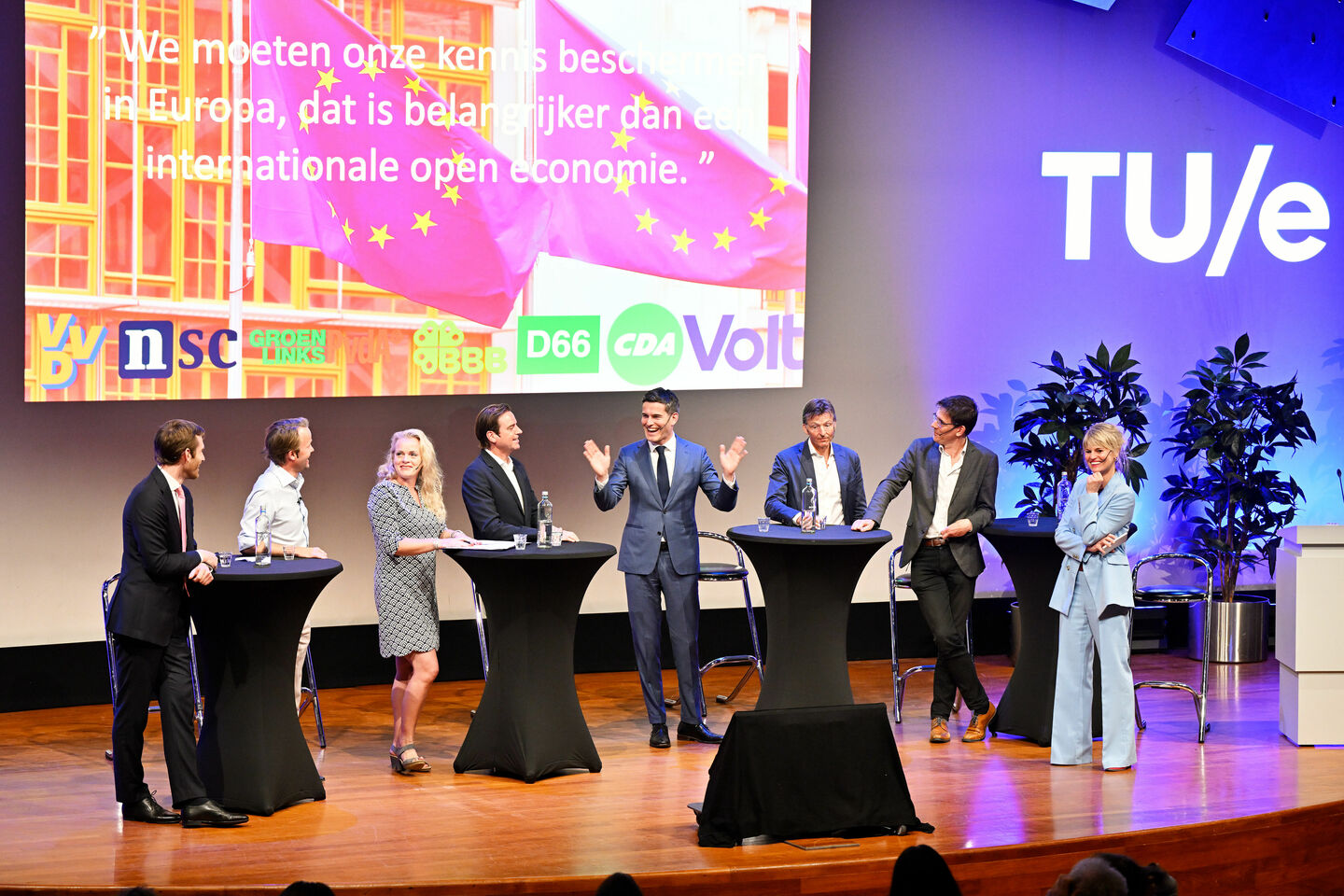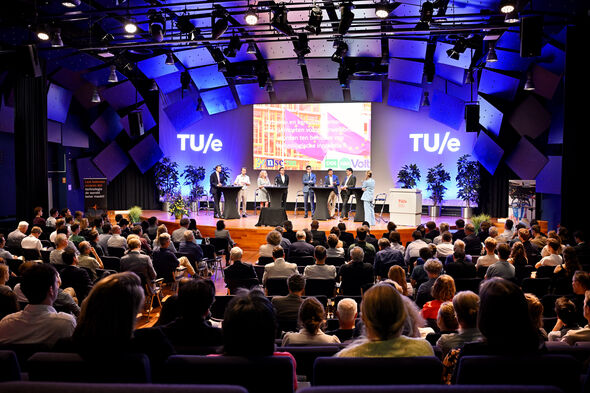
‘Brainport as a source of inspiration for Europe’
Report on innovation debate with European party leaders
China provides state aid worth billions to innovation and the United States has an enviable subsidy program for green energy. The only way for Europe to compete with these countries, the innovation debate with European party leaders at TU/e revealed, is through collaboration. And the region that should serve as a source of inspiration in this respect? Why, Brainport Eindhoven of course.
In its geopolitical battle with the United States and China, Europe mainly depends on its internal collaboration, says Tom Berendsen, party leader for CDA in the upcoming elections for the European Parliament. Because there’s no competing with the Chinese state aid and the American subsides. “Europe’s no match for those”, says Berendsen.
When it comes to better collaboration, Europe would do well to copy Brainport Eindhoven. What those lessons from Eindhoven are? “Challenging and motivating each other, but also being happy about each other’s achievements,” summarizes Berendsen. “That should really also be the European Union’s strongpoint.”
The CDA party leader makes the remark on collaboration at the end of the debate, which also featured Bas Eickhout (GL/PvdA), Malik Azmani (VVD), Dirk Gotink (NSC), Gerben-Jan Gerbrandy (D66), Jessika van Leeuwen (BBB), and Reinier van Lanschot (Volt).
The debate was disrupted for a while by pro-Palestine protestors, who loudly banged the doors to the Blauwe Zaal. This was a source of distraction at first, but once the microphones had been turned up a little, everyone was able to follow the debate again.
Regulatory burden versus innovation
Theo Henrar, President of employers' organization for the technology industry FME, which co-organized the debate, had already called upon the Euro MPs present to keep the laws and regulations manageable: “The party leaders need to ensure that Europe is no longer a champion of regulatory burden, but of innovation.”
Hellen van der Plas, Director of lighting company Signify (the precursor to Philips Lighting), made the same appeal in her keynote speech. “Europe shouldn’t just be a regulatory power, but also an innovation power. We need a level playing field, fair competition and open collaboration.”
This level playing field is lacking, given the big differences in state aid between countries like Germany, France and the Netherlands. Governments and businesses should join forces more often, Van der Plas thinks. “Public and private parties need to work together more to attain the European innovation objectives.” According to the Signify executive, more attention should be paid to the implementation of policy in particular, because this is where things go wrong, in spite of the ambitious objectives in the areas of energy and climate.
Geopolitical power
China’s emerging geopolitical power was the common thread of the debate. No longer merely the world’s workshop, China has acquired a key position in the area of essential raw materials for the energy transition and is also becoming increasingly innovative in such areas as electric cars. “We mustn’t be naive anymore when it comes to China,” says Malik Azmani of VVD. “We have to do a better job protecting our knowledge, because it should no longer be possible for China to steal our inventions.”
“If all we look at is protecting knowledge, we’re fighting a lost battle,” Reinier van Lanschot van Volt counters. “The transition to a climate-neutral economy goes hand in hand with knowledge sharing. Knowledge doesn’t care about borders. The smartphone in your pocket contains parts made in 25 different countries.”
Debater Bas Eickhout of GL/PvdA agrees with the statement that Europe must lose its naivety. “We have a lot of green innovation in Europe, but its often scaled and produced in China. We shouldn’t be naive anymore, concluding free trade agreements like we used to. Europe should once again conduct industry politics, and spend more time thinking about where the necessary raw materials should come from and what the investment policy should be.”
Vital infrastructure
“I’m happy to hear we’ll be investing in Europe’s industrial capacity,” Jessika van Leeuwen of BBB responds. According to her, ‘vital infrastructure’ is falling into foreign hands. “That worries me.” Van Leeuwen thinks farmland should also be defined as ‘vital infrastructure’. She says French farmland is being purchased by parties from China. “China can do a lot, but the country isn’t good at feeding its own population. The Netherlands has vital agro-tech knowledge we can use in our negotiations with China. In principle, BBB advocates an open economy.” Van Leeuwen likes the idea of China and Europe working together. “But we must protect vital knowledge and infrastructure.”
Dirk Gotink of NSC also thinks Europe should be wary of giving its knowledge ‘away for free’. “The Chinese are drooling over everything that can be found here in Brainport. ASML is geopolitically relevant. We have to do a much better job protecting that.” For one thing, Gotink feels that the European Commission should have the power to block acquisitions of European companies by parties from China.
This requires politicians to be much more aware of technological developments. Otherwise you can’t pursue an industry policy or protect companies against acquisitions, Berendsen from CDA stresses. “By now, everyone’s familiar with ASML. But the possibilities and impact of photonics are far less widely understood.”
Labor migrants
Attracting labor migrants is the next topic of debate. According to Gerben-Jan Gerbrandy of D66, attracting labor migrants is very necessary. “We have an ageing population and want to keep growing economically. At the same time, we are in the midst of two revolutions that are taking the world by storm: a far-reaching energy transition and the ongoing digitization of society. When it comes to knowledge, we have to do our utmost to procure the brains for Europe.”
Gotink of NSC has a different take on this. “There’s a tremendous amount of pressure on all kinds of facilities in the Netherlands, such as affordable housing. Or take the trains and the power grid: we’re hitting a wall everywhere.” NSC doesn’t want to tinker with the free movement of persons in Europe, but it does want to curb migration.
According to Gotink, this can be achieved by being more selective when it comes to the sectors that are given space to grow. “Every few miles there’s a distribution center in the Netherlands. Those aren’t companies that add a lot of value to the country. We have to make much more pronounced choices when it comes to what kind of economy we want to be. We need to focus less on the jobs at the lower end of the labor market.”
The agricultural sector ‘needs to change’ as well, Gotink says. “Agriculture’s business model needs to change; it shouldn’t be dependent on insanely cheap workers. The exploitation of labor migrants is nothing short of malpractice.”
More natural scientists
“Why do we have labor market shortages?” Van Leeuwen of BBB wonders aloud, and then proceeds to give the answer herself: “We’ve become a country of humanities scholars. I’d love to see more natural scientists in the Netherlands in the long term.”
If we’re looking at knowledge migrants, we need to invest in them properly, says the BBB candidate. “Knowledge migrants come to the Netherlands with a short-term vision. London is where they really want to be, so they often quickly leave again. How do we make sure those people say: the Netherland’s isn’t all that bad, so this is where I’ll integrate and raise my kids.” That also creates more support in society. “Senior citizens in Eindhoven are having a hard time ordering a coffee in Dutch.”
Van Leeuwen also thinks more investment is needed in the business climate. “Shell’s headquarters already left the country. The industry deserves support. The asphyxiating climate policy is wreaking havoc on industry.” Brussels wants to be climate neutral by 2050 ‘whatever it takes’. According to BBB, Europe’s climate ambitions are ‘neither feasible nor affordable’ and the continent needs to get rid of them. “We have to be more sustainable, but we do need to give industry space. We want to be able to take our time, taking a gradual route that everyone is comfortable with. If you’re in the red, you can’t go green.”
Can’t get anywhere
Eickhout of GL/PvdA gives a fierce response to Van Leeuwen’s arguments. “For a long time we didn’t impose any rules on the automotive industry, which led to diesel gate. In the meantime, China realized the electric car is superior. With policies to match, they’ve taken the lead in this area. Europe woke up thanks to Frans Timmermans. Without rules, you can’t get anywhere, and China overtakes you.”
Gotink of NSC is also critical of BBB, their prospective coalition partner in the Netherlands. “This is BBB trying to leg sweep the Paris Agreement. Companies and farmers are busy working on climate policy. Back off, BBB.”
In her concluding statement, Van Leeuwen sings the praises of the Dutch industry. “It has the cleanest production processes in the world. If we don’t improve the business climate, industry will disappear and set up more polluting assembly lines somewhere else. If that happens, we’ll have lost the cornerstone of innovation in the Netherlands.”


Discussion